A neighbour is setting up some deckchairs and a picnic table on the back court.
This is what I call “the Glasgow rain dance.”
See also: “summoning a postman” (drawing a bath).
A neighbour is setting up some deckchairs and a picnic table on the back court.
This is what I call “the Glasgow rain dance.”
See also: “summoning a postman” (drawing a bath).
The view from our back window is fairly depressing. We live three floors above a busy commercial street, so our “back court” (the area where wheelie bins thrive) is actually the flat roof of a restaurant, all stainless steel extractor fans and outlet vents.
We can see various neighbours’ back courts at their vista of junk, including mountains of seldom-touched outdoor children’s toys, dropped bicycles with training wheels still attached, and hopeless lockdown purchases: mini trampolines, hooded barbeques, not used since we moved downmarket almost four years ago. There’s a fridge-freezer out there, and a never-again-to-be-collected wheelie bin with planks of wood burping out of it.
What frequently cheers me up though, when looking out of said window, is the sight of my downstairs neighbour walking his cat.
The cat is quite a fancy longhaired breed, but he seems to cooperate quite demurely with his master’s antics.
He’s not even on the lead today.
If you have a bite of apple after a bite of sandwich without waiting long enough, it tastes exactly like your school lunch box.
In bed with eczema today and reading science fiction.
I may not have escaped my certain fate after all.
Gah! Just as I’m trying to find some distraction in this world, here’s some very good eczema writing by Rebecca Gisler in About Uncle.
My brother and I have the same flaws, and the first of those flaws is that we have eczema, which is to say that, rather than protecting us from external aggressions, our skin itches endlessly, and it goes rough and dry like old crocodile leather, and it cracks and it fissures and it furrows, because over the years raking that defective skin has become as natural and unconscious as breathing, and some people say our skin is too fine for this world, that we’re allergic to it.
and
from the emptiness deep down inside us, from the stirring and throbbing of the emptiness inside us, and that’s what turns us into these louse-infested beasts, these fleabags, these bundles of nerves that no balm can soothe, but enough whining because it’s also true that scratching when you have an itch, even if it’s all the time, where you have an itch, even ifs everywhere, brings an intense pleasure and deep satisfaction, and we could easily devote our days and weeks to it, reducing ourselves to sawdust and shavings with fingernails and rasps and anything else we might find at hand, never thinking of the consequences, not thinking of anything, thinking of nothing, the very nothing than binds my brother and me, the reason we’re never at peace.
Mark texts: “you can say cunt all you like, you’ll always be this guy to me!”
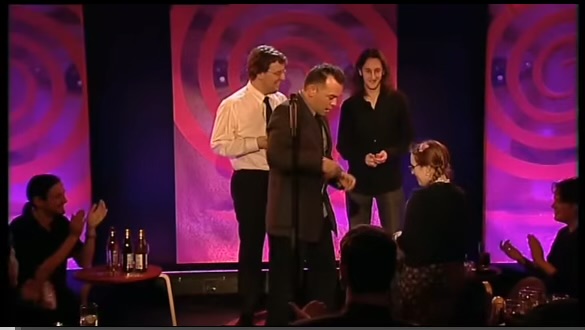
This comes up very occasionally. Someone will say “Oi! That was you in that!”
The most recent person to do so was Carrie Marshall.
Here’s the full, illegally-uploaded thing:
A time-travel spy caper:
The Man Who Was Next Thursday.
Oh come on, that’s really good.
A bit of audience participation from a handsome fellow in Seymour Mace’s beautifully sweary show.
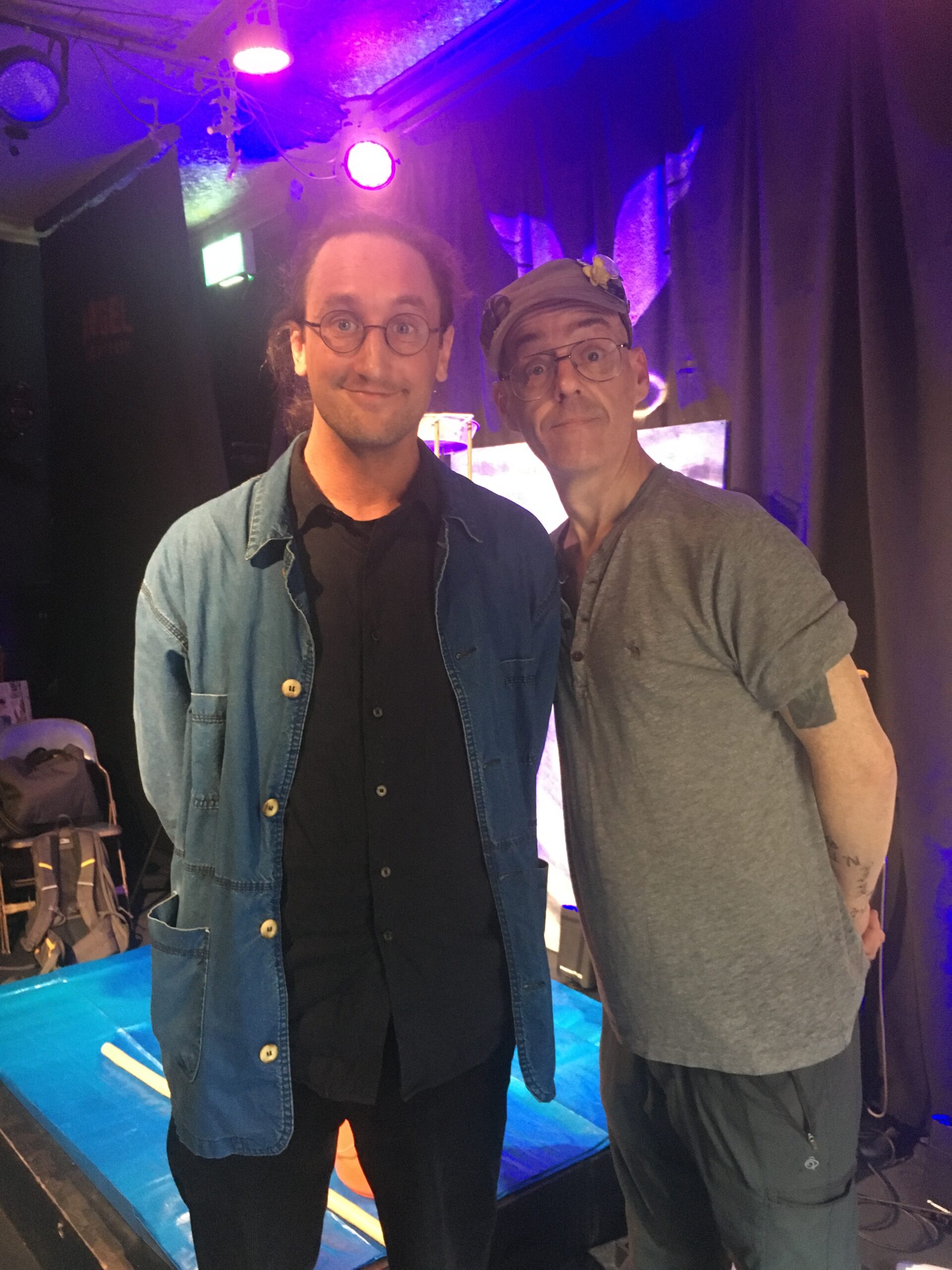
In an antihistamine-induced stupor, demi- and semi- idea fragments drift across the surface of my mind like floaters across an eye.
One such fragment, today, are the words “Aphid Todayphid,” which sounds like a topical news magazine for aphids.
Aphid Todayphid: all the news that fit to print, but really, really small.
I like the idea of being in a scrum of journalists at a press conference:
“Yes, Robert Wringham for Aphid Todayphid. Mister Prime Mininster, what is Number 11’s line on the economic impact of this latest u-turn?”
“Thank you for your question, Robert. Um, sorry, Aphid Today?”
“Phid.”
At least we have an earthly use for font size 1 now.
To be highfalutin, the Iceman has roots in the Fluxus experimental art movement of the Sixties, where the process is more important than the result. Here, Irving’s ‘let’s just give this a try’ ethos results in a shared sense of meaningless fun, that should, by rights, only exist in the moment – though we should be grateful, too, that it has finally been recorded for the ages.
A spectacular Chortle review of “The Final Block,” the recording of the event we put together at the Bill Murray Comedy Club last year.
To be clear about what this is, my team and I are making a documentary film about the Iceman. We needed more footage of him in action, so we put together a gig. But we also got the gig filmed by Go Faster Stripe, legendary comedy production team. What’s being reviewed here is the Go Faster Stripe recording, not our film. You can buy that recording for a tenner here and I suggest that you do!
Steve, the reviewer, really gets what’s going on. Here’s an important bit:
‘The whole concept of The Iceman is failure,’ Irvine tells us – and it’s a notion that he proves from the start – when he pours a bucket of water over himself and damages the microphone.
A lesser comedian might have cut all the futzing around that resulted, but leaving some of this in captures the joy of amateurism, in its true sense, that his act celebrates. Trying to sum up what his charmingly ramshackle performance achieved, Irving concludes: ‘Something has happened that wouldn’t otherwise have happened’. What more reason does one need?
It’s one of my favourite moments of the show, indeed one of the best things I’ve had the privilege to witness in my life. The director, Chris Evans, understandably went bananas when Anthony wrecked his expensive radio mic. This happened early in the show’s proceedings. It could have been ruinous, but it made the whole night.
“We need to mic you up again,” said Chris, “Being able to hear you is the whole point.”
“The whole point,” Anthony corrected him, “is to melt the block.”
All of this is in the show. We open with a quote from Chris “If I end up on stage, something has really fucked up.”
Still unwell with the old eczema, I’m starting to worry about a trip to London I have to make on the 29th.
It’s an overnight trip for the film and I found a hostel ten minutes from where we’ll be working. As well as providing a bed for the night, I could use the hostel during the daytime (after 3pm anyway) to dip out of the shoot for some sudocrem and a lie down if things become overwhelming.
I went to book it today and – whaaaaa? – there’s an age limit. You can’t stay there if you’re over 36. I’m 42.
I stay in hostels quite a lot these days, but I’ve never seen that before. In fact, one of the things I like about hostels is the diversity of the people staying in them, different age groups being one of the things I’d noticed. When evangelising about hostels as a way to see the world, I’d even told people that “youth hostel” is a misnomer these days.
After abandoning a plan to buy a Central London building to start my own hostel exclusively for the elderly, I managed to find an alternative one. Cheap place to stay in Notting Hill are few and far between though, so the hostel I’ve booked into is a 25-minute walk from the shoot.
Pray for me, everyone. I am itchy and sore and seeping and at my wit’s end.
But I WILL be in London to talk to a man famous for melting ice in the 1980s.
UPDATE: It didn’t happen. I had to cancel.
For the first time in my life, I’ve grown a beard.
It looks as I’ve been away somewhere for a good think.
Yet nothing could be further from the truth.
A sign for an auction house promises “thousands of antiques” but it looks about thirty years old.
It’s either hubris (“our suppliers will never, ever let us down”) or defeatism (“no one will ever buy this shit.”)
I mention the eczema syncronicity to Samara.
“I was really going for it as well,” she says, “obliterating horseradish while cursing my enemies.”
Is that a tradition?
“Yes. I mean, not that I’ve heard of. But yes.”
Soothing my eczema in a Dead Sea salt bath.
I find myself scratching and realise it’s to the rhythm of Samara who, in the kitchen next door, is grating a synagogue’s worth of horseradish for tomorrow’s seder.
It feels very, very Jewish in here.
I’d better open a window.
I’m slowly but pleasurably editing Dickon Edwards’ Diary at the Centre of the Earth for print. You heard it here first.
I’m up to summer 2006 and Dickon is at Latitude Festival. “My feet are killing me.”
I was there for that!*
Truth be told, I remember being very excited by the prospect of meeting Dickon. On our way in to the festival, I spotted a ticket stub on the ground with the “Richard Edwards” and a London address printed on it. I wondered if it belonged to Dickon and I should retrieve it for him. I was with Neil though, who, better connected, knew it wasn’t the correct address and that the name was just coincidence. I was jumpy, looking for Dickon in all the wrong places.
I soon spot him in the comedy tent during Robin Ince’s Book Club, standing aloof and jotting feverishly. “I always carry a notebook,” he says somewhere in these Diaries. Even then, we don’t actually meet and I must wait a little longer.
When we finally cross paths in the mud, I’m lucky to be wearing my three-piece suit. “Well look at you,” says Dickon, seemingly impressed at my shambolic attempt at dandyism.
I go all shy.
Shortly after leaving Dickon, some teens ask for a selfie with me in my suit. It’s the sort of thing that more usually happens to Dickon than me. My teens are respectful. They say “It’s just not the sort of thing you expect to see at a festival.”
Later, backstage at the literary tent, I’m annoyed when Neil doesn’t introduce me to Martin White properly, or indeed at all. It’s a bad habit he has, which he would repeat years later when we meet Momus at the Glad Cafe in Glasgow. As it happens, I’m friends with Momus now, but in 2006* I lacked the confidence for a more assertive hello to Martin. As such, Martin spends the rest of the night wondering who I am and why I’m trailing him and his friends around the field.
When I try to break away from the group on pretence of seeing an unadvertised Buzzcocks performance in the woods, Neil challenges me to “name three Buzzcocks songs,” revealing that I can’t and that I’m making excuses. I trudge on, a despised junior, an outsider to the outsiders. Gervais kicks Ince, Ince kicks White, White does his best to ignore me.
I should have found Dickon’s “Well look at you” more nourishing at the time. It was perfect. Not too much, not too little. Exactly what I must have been looking for when putting on my suit in the first place. Thank you, Dickon. It took me almost 20 years to realise you made my day, but you did.
*Correction: Neil and I were at Latitude 2008, not 2006. I am an unstuck-in-time idiot.
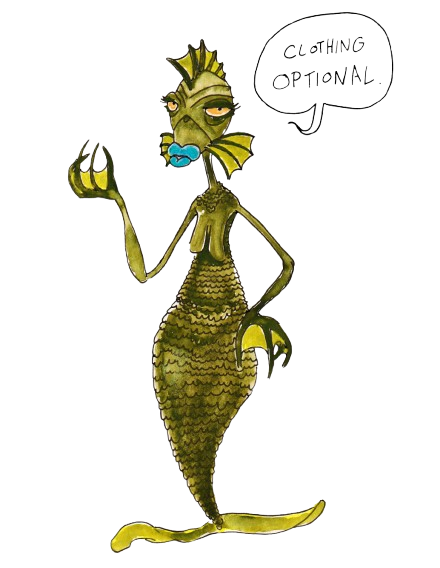 Samara’s been running a blog since the start of the year, in semi-secret. She’s finally allowed me to mention it in public.
Samara’s been running a blog since the start of the year, in semi-secret. She’s finally allowed me to mention it in public.
It’s called “Monster of the Week” (after the TV trope beginning with The X-Files) and its literally that. Every Thursday at 3pm, she’ll post a picture she’s drawn of a famous monster.
Highlights so far include the Cyclops from Jason and the Argonauts, the Bride of Frankenstein, Undersea Gal from The Nightmare Before Christmas (pictured above) and “dank and vile” Armus from Star Trek.
It’s great that she’s been quietly beavering away at this. Now, after a few months, the blog feels populated, towards encyclopaedic.
There are some real deep dives in there. Fiendish Feet yoghurts anyone? And what about Gritty, the mascot of the Philadelphia Flyers?
Each monster, if you give them a click, comes with an out-of-context description cribbed from Wikipedia or similar, usually with some entertaining links. The aforementioned Gritty’s description comes from a Philadelphia city council formal document in which they declare him “a fuzzy Eldrich horror.”
Awake late, my blurry eye is drawn to an illuminated window on the other side of the street.
What I take at first to be a man in a Star Wars mask with his dick out is just a laundry bag hanging on the back of a door.
I feel the pang of disapointment, but I also think “well, so what if it was?”
And that’s the sad thing.
Would I really not be delighted to have glimpsed such an odd thing so seredipitously? Would I not have been pleased as punch to have won such a lottery?
Am I become jaded?
Off to the post office, I hear a man saying “you might think that’s a normal way to walk, but it’s not.”
Always open to offers of free gait analysis, I stay alert.
Alas, he’s not talking to me. He’s talking to his friend.
They’re returning from some sort of sporty workout and the main speaker is carrying his water bottle in that slightly macho upside-down way to suggest he’s well up on screw-on caps.
They’re talking about their kids.
“‘Walking like wha-?'” he quotes his child. “‘Walking like that,’ I says, ‘you might think it’s normal but it’s not.”
“It’s not normal,” says the nodding friend, “it’s really not normal.”
“He just comes in, walking like this: zooooooo, zooooooo…”
They’re behind me so I don’t see the walk. The zoomy sound makes me imagine the kid was riding an invisible motorbike around the house. If that’s what the kid is doing, his dad is right and it’s not a normal way to walk. It’s a fun way though, and I should know.
“…And I says, ‘whit you walkin’ like that for?’ and he says ‘like what?’ and I says ‘like this’ an’…”
“Haha,” says the friend, “I know, I know.”
“‘like that,’ I says, ‘walking like that‘.”
It went on and on.
Healthfucked, I’ve not been doing much of late. I mope mostly.
There’s a YouTube series I’ve taken to watching, about a couple who’ve escaped the inhospitable London “rental market” in favour of cruising around the country by narrowboat.
It consists mostly of idyllic b-roll of sleepy fields and ducks a-dabbling, but sometimes they moor up in one of those city centre waterfronts surrounded by All Bar Ones. When this happens, our heroes indulge in “porthole cinema,” watching the Muggles scatter back and forth between lunch engagements.
If that’s ever us, I vow, let’s make sure our sex time coincides with business lunch and that the salad eaters can see our bottoms going up and down through the porthole. Just perfectly aligned.
AJ sends me this picture he’s seen online because it looks like the character from my novel, especially in the book’s second act.
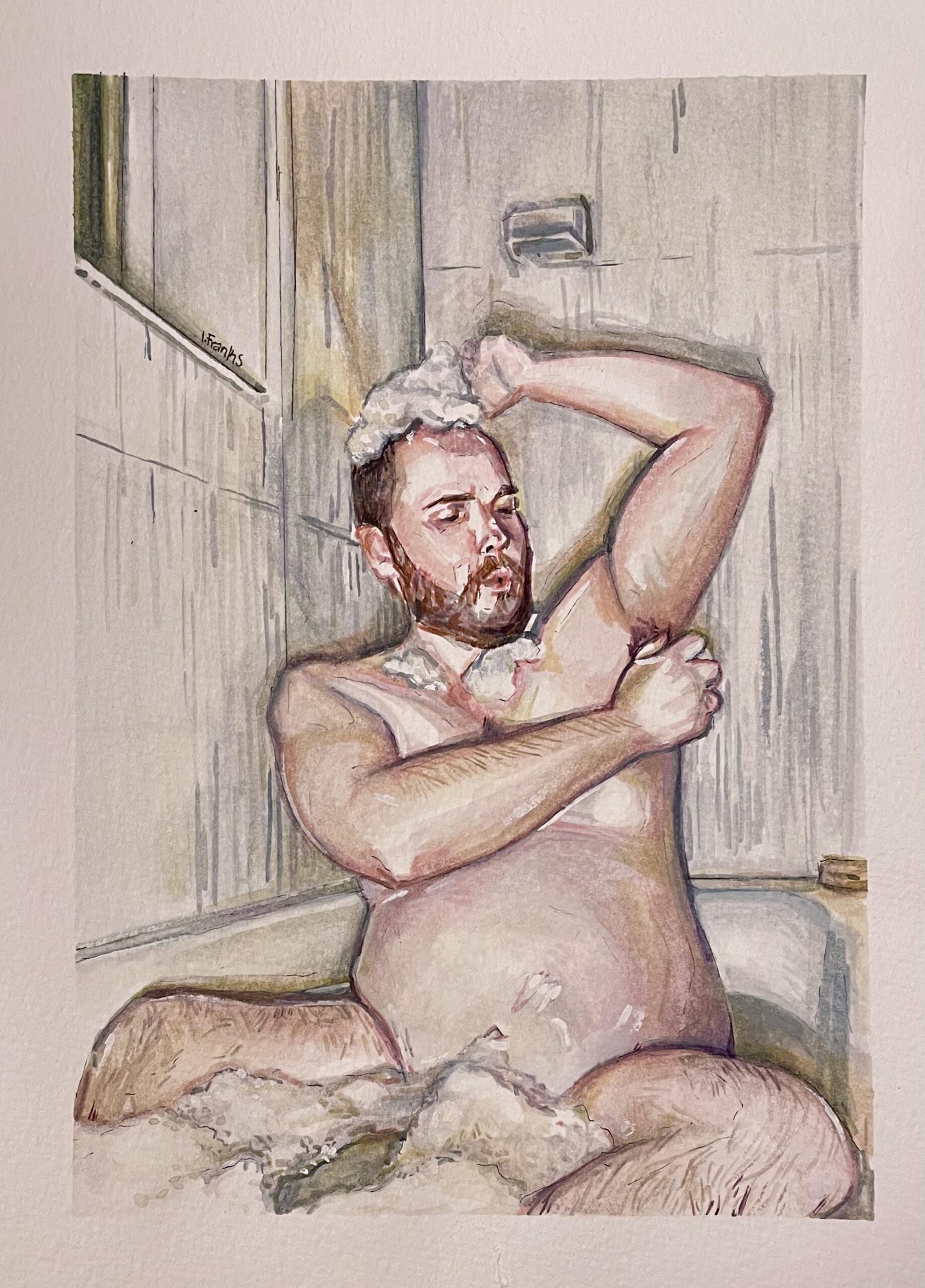
“The dude,” says a comment, “looks unbothered, moisturized, happy, in his lane. Thriving.”
“hot” says another.
“+1 on that dude,” says a third, “like, goddamn, hot.”
They’re not wrong. The artwork is a self portrait, so the praise leaves the artist blushing. The thread is nothing but a delight.
As it happens, Mac, the my novel’s cover artist based the canonical Mister Bob on himself too.
The overwhelming reaction to this artist’s sexiness made me think of that crappy review someone left about the book. How could anyone not love Mister Bob? Look at him. Clearly they didn’t stick around for the arc.
“Shimmering” is the word I used in the book trailer. Mister Bob is shimmering.
I wasn’t the only comedian to be subjected to Tony’s often incisive and always loud criticism of our skills. It happened to all of us, usually when we were doing it.
My friend John Dowie on his friend Tony Allen on what would have been his 80th birthday.
Amusingly he plugs our book at the bottom of the piece.
This was written for New Escapologist‘s now-defunct Patreon situation in 2020. It was the first of a show-and-tell series called Hypocrite Minimalist.
Object Number 1 in our inventory is a seashell.
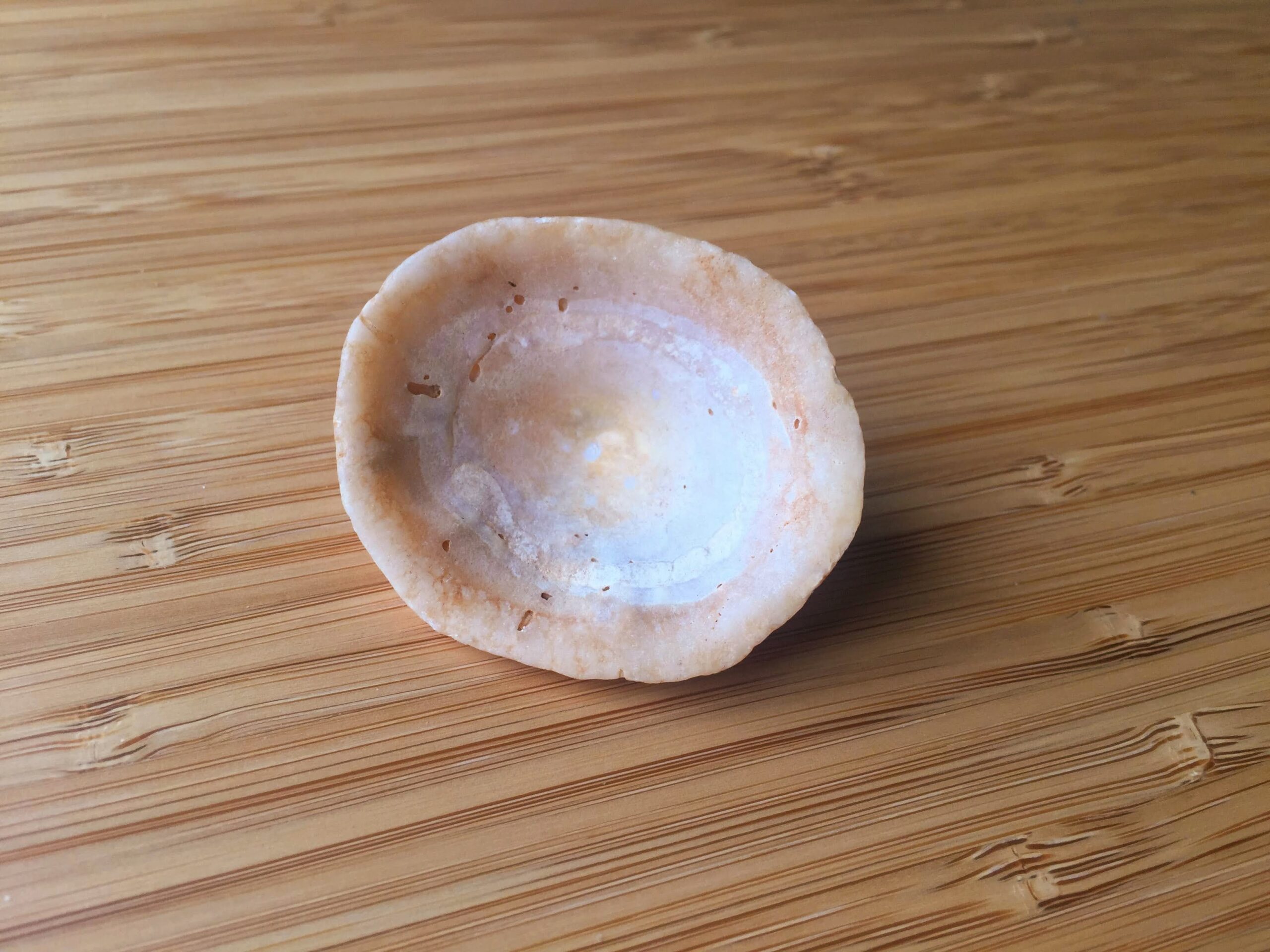
There’s a Glasgow writer and artist called Alasdair Gray. Well, there was, anyway. He died in December 2019. In life, he was the most famous writer in Scotland but was still (and is still) underrated.
His novel, Lanark, is considered remarkable by those who know it, but it’s not as widely read or adored as it should be. At the very least it should be considered a fantasy equal to Gormenghast, but really it should be more firmly ensconced in The Canon of Great Modern Literature. It’s a stunning book.
I became a devotee of his work in about 2004, hunting down and reading all of his harder-to-get novels and stories, visiting the places where his paintings or murals were purported to hang. I would not have fallen in love with Glasgow in the way I did were it not for Gray’s books.
Gray lived in Hillhead, one neighborhood away from mine, so I’d often see him shuffling around, usually on his way to the pub. I don’t think I ever took his easygoing presence for granted. Frankly, it always seemed miraculous that he was still alive: as well as being legendary, he was old, asthmatic, a boozer. I knew we were privileged to have him, that it was like being neighbours with Kurt Vonnegut or Angela Carter, a great cult author who’d always mean something to someone.
When he died, my photographer friend Alan was asked to photograph Gray’s flat before it was taken apart (he’d taken some shots of Gray himself at home earlier in the year). It was a rented flat and, while his sketchbooks and manuscripts would be looked after properly in an archive, the flat itself would not be preserved. I managed to attach myself to Alan so that I could go and have a look inside.
You can see loads of pictures of Gray’s flat by Googling, but here’s one I quietly took while visiting:

The place was packed with books and paintings and… souvenirs from nature. There were lots of little bones and stones and, yes, seashells. Apparently he’d bring them back from his walks on beaches. There are some seashells on top the heater in the picture above.
I did not steal the shell from Alasdair Gray’s flat, I hasten to tell you! I did not loot! No, while I was there, I made friends with Alasdair’s niece, Kat, who was clearly amused by my nervous, fanboy attitude to her uncle’s house. “I can’t believe I’m actually here,” I kept saying.
Gray’s flat, after all, is in the Lanark novel, when the protagonist walks through a hole in reality and meets his author. It was not this very flat, unfortunately, for the book was written when Gray lived a few streets further east, but the feeling was still uncanny. For just a little while, I felt like I was in Lanark. Well, I almost always feel like I’m in Lanark, actually, because there are so many recognisable Glasgow landmarks in the book, but by being in the flat I was in the very heart of Lanark. Sort of. In fact, one of the things I spotted was a metal trunk with the words “Lanark manuscripts” scrawled on it.
Anyway, blah-blah-blah. Get to the shell!
I met Kat for brunch a few weeks later. The efforts to box up her uncle’s archives was complete. And she’d brought me a memento: one of the seashells.
Gray had actually doodled on or inscribed some of the shells, but those were all destined for the archive and, I daresay, closer friends. But I have something from Alasdair Gray’s flat, for goodness sake. A talisman! A small but giddy treasure.
Here’s a picture Kat sent me of the shell before it was removed from the flat (next to another shell displaying Gray’s handwriting):

And here’s one last quiet photograph I took in the flat. The drafting table is where he worked:

*
Kat runs an Alasdair Gray website called A Gray Space. It includes, among other things, a virtual tour of the flat.
Here’s me and Kat, meeting for the first time in February 2020, in another pic taken by Alan.
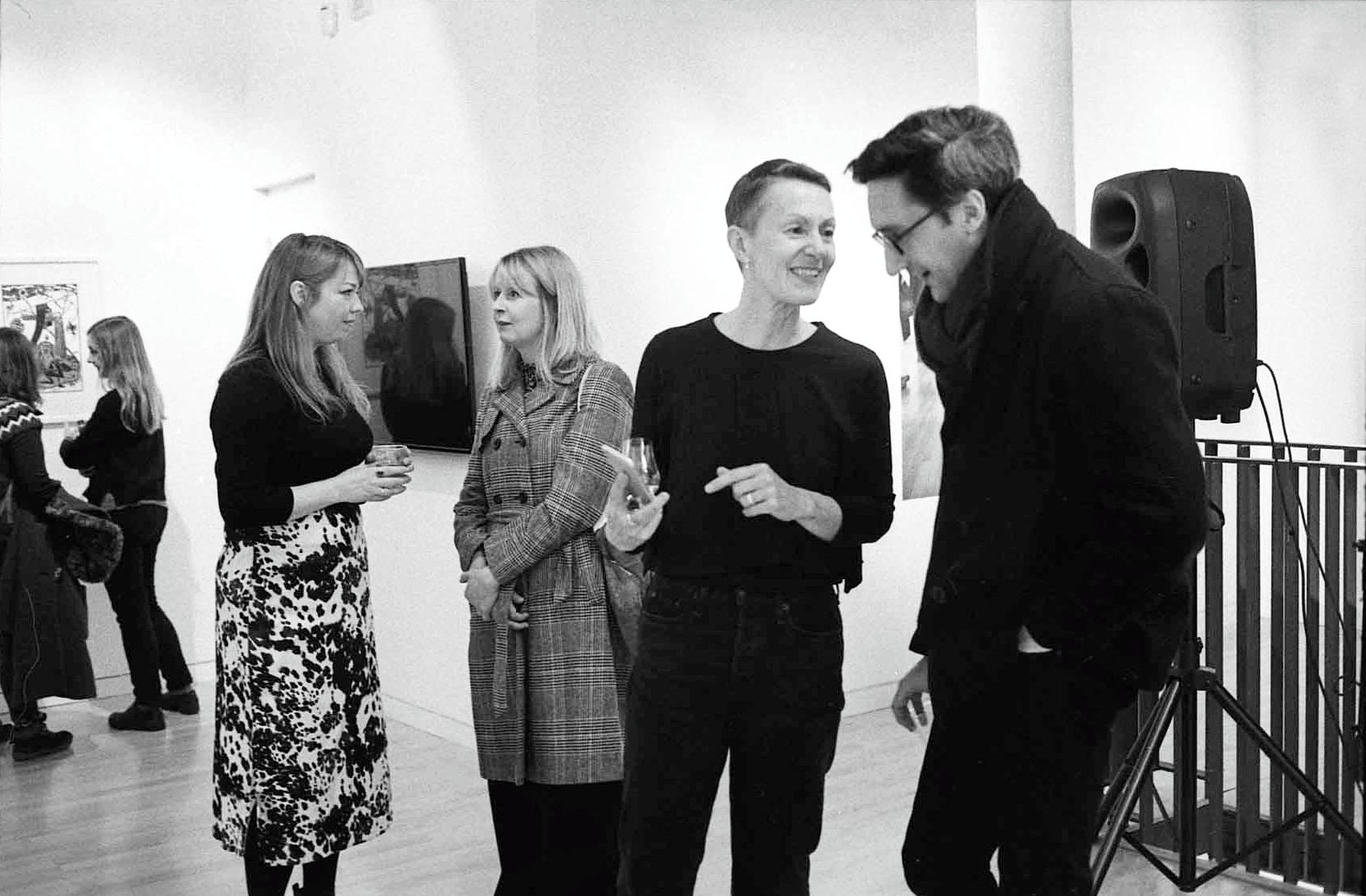
I’ve been expecting a delivery of nice envelopes, so I can improve my posting-things game. It’s all go around here.
I thought they came today, but when I tore into the packet a bra came out.
I’d opened my wife’s mail by mistake.
Ordering bras on the internet though. What a pervert she is.
Meanwhile, at the Idler website…
“It’s drugs and bubble gum for me till July, says Robert Wringham.”

The Good Life for Wage Slaves is also their Book of the Week, and I’ll be doing a live “in conversation” on Zoom with Tom Hodgkinson on Thursday 16th. It’s practically a takeover.